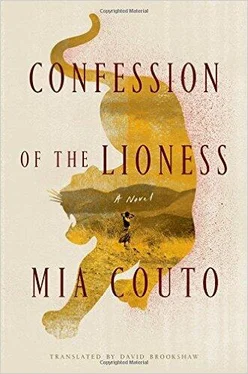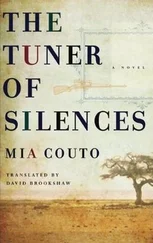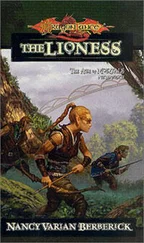The name I chose for this unimaginable child is, after all, the right one. For my descendants will be forged out of the same matter that is released from the waves and flutters away until it is no more than a void. I shall never have children, I shall never have anyone to give a name to.
And yet, every new moon I suffer spasms, and in the solitude of my bed, I give birth. Dozens of children, I’ve had dozens of children, no other woman has given birth so many times. Babies without number have been born and every one of them has become extinguished a moment later like a shooting star crossing the skies. My hopeless children have vanished away, but the true pains of those hopeless births will haunt me for the rest of my life.
My mother, Hanifa Assulua, who knows about suffering, gave me sound advice: Pains pass, but they don’t disappear. They migrate into us, come to rest somewhere in our being, submerged in the depths of a lake.
The Hunter’s Diary: SIX. The Reencounter
I’m only happy before I live. I only recall within my dreams. That is why I write.
— EXTRACT PILFERED FROM THE WRITER’S NOTEBOOKS
Tandi is buried early in the morning. There aren’t many people at her funeral. Most of them are women. The administrator puts in an appearance, accompanied by his wife. The deceased was, after all, their maid. The absence of her boss would provoke suspicion in the village. In contrast to her husband, Naftalinda looks shattered. At one point she tries to make a speech. But her sobs prevent her from speaking. She composes herself, wipes away her tears, and gradually assumes a pose of majestic grandeur:
The lions are besieging the village and the men continue to send the women out to look after the allotments, continue to send their daughters and wives to collect firewood and water in the early morning. When are we going to say no? When there are none of us left?
She hoped the other women would respond to her invitation to rebel. But they shrug their shoulders and walk off, one by one. The First Lady is the last woman to abandon the ceremony. Deep inside her, she feels like the very last woman. Just as I feel like the last hunter.
* * *
When the service is over, Florindo comes up to me to announce that rifles will arrive the following day.
You’re going to have reinforcements.
I don’t need any. All I need is me. Keep the weapons for something else. To combat poachers, for example.
Maliqueto and Genito are going to get weapons and will be under your command.
I’m not going to command anyone. If you want to form another team, that’s fine. But what I’ve got to do, I shall do by myself.
The discussion gets more heated. Those present move away as a sign of disapproval. This is not the appropriate time or place. But the administrator is too excited:
Do you realize the political risk I’m taking? That I staked everything on this hunting expedition for my promotion? What is it you want me to do, to get involved in other procedures?
The writer draws us away, far from the church. It’s he who resumes the conversation:
I don’t understand, my dear Makwala. What do you mean by “other procedures”?
To tell you the truth , the administrator replies, I’m beginning to have my doubts about these lions. Because they come into the village, even during the day, and their intentions are almost human …
The writer laughs, but Florindo doesn’t give up: These animals are looking for someone, sniffing around doors, they are killing to order. They can only be fabricated lions: Why else would they not eat the poisoned meat left out for them before as bait? And why did they tear up clothes left out on the clotheslines?
You can be sure of this: No true lion would behave like this , the administrator concludes emphatically.
* * *
When we get back to our quarters, I prepare lunch. The writer is in the living room, working. I notice he keeps peering at my chaotic papers. I don’t care anymore. I also read his notebooks and even steal the odd sentence of his. On the other hand, I’m beginning to get a somewhat tardy taste for writing. Something about the act of writing suggests the pleasure of hunting to me: In the emptiness of the page, there are infinite shocks and surprises concealed.
I serve Gustavo his lunch and fill his glass. The writer begins to feel uncomfortable with such ceremony. During our meal, neither of us exchanges a word. Afterward, I go to my room and return with a rifle that I throw abruptly into his arms.
What’s this, Archie?
It’s yours. The rifle is all yours.
Please, Archie, what the hell do I want with this filthy weapon?
I raise the palm of my hand as a sign for him to listen, without any interruptions.
Do you remember what happened that night when Hanifa called us? Do you remember how I hesitated to pull the trigger?
The writer places the weapon on the floor with the utmost care, as if he were handling an explosive device. I wait for him to finish this delicate operation before going on:
Some days ago, Gustavo, you wanted to know which hand I used to shoot. Well, I use neither the right nor the left hand. I no longer shoot.
I don’t understand.
My fingers don’t obey me anymore — my fingers have died. The truth is this: I can no longer hunt.
I hold my arms up high, displaying my fingers, which are crooked like old hooks. The writer is lost for words. I have come across as being so sincere, so vanquished, that he can’t come to terms with seeing his image of me crumble before his eyes.
I’ve lost my hands , I conclude, defeated.
I observe my hands as if I’d never seen them before, as if they were completely strange. In exactly the same way as my brother Roland had contemplated his useless body in the hospital.
Don’t tell anyone , I beg in a whisper.
No one will know , Gustavo assures me. Then he asks: Forgive me, but wouldn’t it be better to accept the administrator’s offer and hunt with the help of Genito and Maliqueto?
Never.
I don’t understand. So who is going to kill the lions?
You.
How?
You’re the one who’s going to kill them.
You’re crazy!
I’ll lead you, don’t worry. At the precise moment, all you have to do is pull the trigger.
I expected the man to be more obdurate and refuse flat-out. But Gustavo Regalo seems to be pondering. Maybe the writer is beginning to yield to a surreptitious desire. He picks up the gun, weighs it in his hands, and aims at an imaginary target.
Do you think I could hit the creature? he asks.
There’s a glimmer of a new emotion in the writer’s soul. There’s the beginning of an almost infantile enthusiasm. And I think: Everything that we have carefully built over centuries in order to remove ourselves from our animal nature, everything that language has covered over with metaphors and euphemisms (our arms, our faces, our waists), in one instant can be converted back to its naked, brutish substance: flesh, blood, bone. The lion doesn’t just devour people. It devours our very humanity.
And if I miss? Gustavo wants to know.
Don’t worry, my dear writer. I’m not giving you the gun to kill the lion. It’s more for you to defend me.
* * *
I hope the writer will defend me. It looks as if he’s already started defending someone: He has sent a report to the central government criticizing Florindo’s inertia with regard to the rape of Tandi.
Читать дальше












